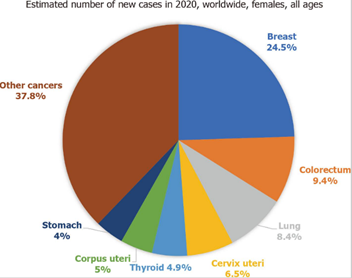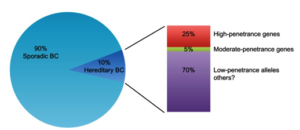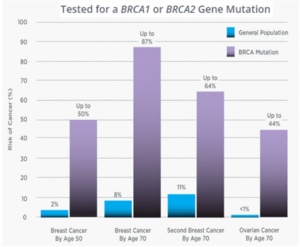Early in my childhood, I listened to the stories of my Maternal Grandmother suffering from breast cancer, her late detection and in spite of her high treatment cost, ultimately resulting in loss of her life at the age of 55.
Alarming Statistics: Breast Cancer’s Grip on India (2020)
Although it’s been more than two decades, all that has increased is more frequent confrontation with breast cancer stories from near and dear ones. Together Breast Cancer patients account for 39.4 percent of the total cancer cases in women in India in 2020, according to the National Cancer Registry Program report by National Centre for Disease Informatics and Research. Compared to western population, it’s also more common in the younger age group. Almost 50% of all cases are in the age group of 25-50. And more than 70% of the cases present in the advanced stage had poor survival and high mortality. Detection , treatment or worst case, loss of a woman’s life at the peak age for their responsibilities for professional as well as personal life leaves a deep void in the family, especially for children raising and fundraising for the family. The fundraising issue becomes more important in urban settings where most of the families have just parents as only caregivers and women are professionally active along with taking care of home and the kids.
Urban Challenge: Breast Cancer’s Pervasive Presence in Cities
In cities like Mumbai, Delhi, Bengaluru, Bhopal, Kolkata, Chennai, Ahmedabad, breast cancer accounts for 25% to 32% of all female cancers, more than 1/4th of all female cancers. It is more (1 in 22 women) for urban women than the rural group (1 in 60 women). Thus, breast cancer in India, where a younger age group is more affected, not only affects a single patient’s life expectancy and psychology, but it takes a toll on the financial, emotional health of a young growing family. While, One woman is diagnosed with breast cancer here per 4 minutes, one woman dies of Breast cancer, in India, every 8 minutes.
New figures spell a startling future – it’s time we took preventive measures.



Genetic susceptibility in hereditary breast cancer. Up to 10% of all breast cancers are caused by inherited germ-line mutations in breast cancer susceptibility genes. High-penetrance genes (BRCA1 and BRCA2) contribute to 25% of hereditary breast cancer, moderate-penetrance genes (CHEK2, ATM, PALB2, BRIP1, RAD51C) contribute less than 5% to the risk of breast cancer.
Role of Early Detection and Genetic Testing
Indeed, breast cancer management needs a series of things to be done in the right manner for patient favored treatment outcomes, earliest detection and screening being one of them. Breast cancer awareness programs, training for regular self check, periodic mammograms, chest X-ray play an important role in early detection of breast cancer. Apart from this, studies have found that almost 10% of breast cancer incidences are hereditary in nature. Indeed, the presence of BRCA mutations increases the chances of breast cancer by 40-80%. Thus, genetic counseling for individuals with breast cancer family history followed by genetic testing opens a new door for early detection and thereby saving lives of many women and restoring a lot of families’ wellbeing.
All one need to do is:
- Acquire thorough awareness about breast cancer.
- Opt for simple but comprehensive, thorough and effective saliva based genetic tests like that in DrOmics for checking the presence of Breast cancer associated hereditary germline mutations which will prepare the individual for a big winning war ahead.
References:




